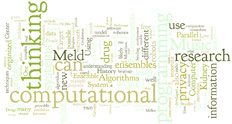Cuny, Snyder, Wing
![]() Computational thinking is a way of solving problems, designing systems, and understanding human behavior that draws on concepts fundamental to computer science. To flourish in today's world, computational thinking has to be a fundamental part of the way people think and understand the world.
Computational thinking is a way of solving problems, designing systems, and understanding human behavior that draws on concepts fundamental to computer science. To flourish in today's world, computational thinking has to be a fundamental part of the way people think and understand the world.
![]() Computational thinking means creating and making use of different levels of abstraction, to understand and solve problems more effectively.
Computational thinking means creating and making use of different levels of abstraction, to understand and solve problems more effectively.
![]() Computational thinking means thinking algorithmically and with the ability to apply mathematical concepts such as induction to develop more efficient, fair, and secure solutions.
Computational thinking means thinking algorithmically and with the ability to apply mathematical concepts such as induction to develop more efficient, fair, and secure solutions.
![]() Computational thinking means understanding the consequences of scale, not only for reasons of efficiency but also for economic and social reasons.
Computational thinking means understanding the consequences of scale, not only for reasons of efficiency but also for economic and social reasons.
Computational thinking is a Carnegie Mellon thing
Computational thinking makes it possible for transplant surgeons to realize that more lives can be saved by optimizing the exchange of organs among pools of donors and recipients. It enables new drug designs to be analyzed so that they are less likely to create drug-resistant strains of diseases. Artists, when given the tools to think and express themselves computationally, can create totally new modes of human experience. Users of the Internet, when empowered with computational thinking, can demystify privacy technologies and surf the web safely.
These and several other possibilities are being realized in the Center for Computational Thinking at Carnegie Mellon University through a collection of PROBlem-oriented Explorations. Working closely with Microsoft Research, PROBEs explore specific opportunities to demonstrate the power and value of computational thinking in a wide range of domains. Our vision is that computational thinking is for everyone, not just computer scientists. To see more, visit our PROBEs page .
Paul S. Rosenbloom
Principal Researcher, Microsoft New England Research CenterOn Computing: The Fourth Great Scientific Domain
April 23, 2012Madhu Sudan
Professor, Computer Science Department and Project Leader, Institute for Creative Technologies, University of Southern CaliforniaTowards Universal Semantic Communication
February 18, 2010More...


